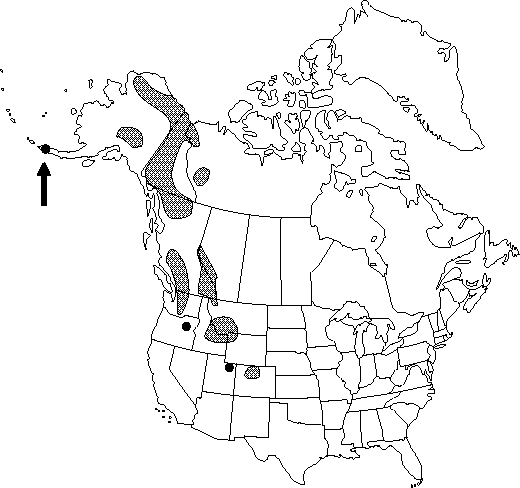Difference between revisions of "Ranunculus gelidus"
Bull. Soc. Imp. Naturalistes Moscou 15: 133. 1842.
FNA>Volume Importer |
FNA>Volume Importer |
||
| Line 9: | Line 9: | ||
|basionyms= | |basionyms= | ||
|synonyms={{Treatment/ID/Synonym | |synonyms={{Treatment/ID/Synonym | ||
| − | |name= | + | |name=Ranunculus gelidus subsp. grayi |
|authority=(Britton) Hultén | |authority=(Britton) Hultén | ||
| − | }}{{Treatment/ID/Synonym | + | }} {{Treatment/ID/Synonym |
| − | |name= | + | |name=Ranunculus grayi |
|authority=B. L. Robinson ex Piper | |authority=B. L. Robinson ex Piper | ||
| − | }}{{Treatment/ID/Synonym | + | }} {{Treatment/ID/Synonym |
| − | |name= | + | |name=Ranunculus verecundus |
|authority=unknown | |authority=unknown | ||
}} | }} | ||
| Line 32: | Line 32: | ||
|elevation=0-4000 m | |elevation=0-4000 m | ||
|distribution=Alta.;B.C.;N.W.T.;Yukon;Alaska;Colo.;Idaho;Mont.;Oreg.;Utah;Wash.;Wyo.;Asia. | |distribution=Alta.;B.C.;N.W.T.;Yukon;Alaska;Colo.;Idaho;Mont.;Oreg.;Utah;Wash.;Wyo.;Asia. | ||
| − | |discussion=<p>Plants with small achenes are often separated as Ranunculus verecundus. Achene size varies continuously over the range given, however, and it is not correlated with the minor shape difference mentioned by L. D. Benson (1948).</p> | + | |discussion=<p>Plants with small achenes are often separated as <i>Ranunculus</i> verecundus. Achene size varies continuously over the range given, however, and it is not correlated with the minor shape difference mentioned by L. D. Benson (1948).</p> |
|tables= | |tables= | ||
|references= | |references= | ||
| Line 45: | Line 45: | ||
|rank=species | |rank=species | ||
|parent rank=section | |parent rank=section | ||
| − | |synonyms= | + | |synonyms=Ranunculus gelidus subsp. grayi;Ranunculus grayi;Ranunculus verecundus |
|basionyms= | |basionyms= | ||
|family=Ranunculaceae | |family=Ranunculaceae | ||
| Line 56: | Line 56: | ||
|publication year=1842 | |publication year=1842 | ||
|special status= | |special status= | ||
| − | |source xml=https://jpend@bitbucket.org/aafc-mbb/fna-data-curation.git/src/ | + | |source xml=https://jpend@bitbucket.org/aafc-mbb/fna-data-curation.git/src/8f726806613d60c220dc4493de13607dd3150896/coarse_grained_fna_xml/V3/V3_1100.xml |
|genus=Ranunculus | |genus=Ranunculus | ||
|subgenus=Ranunculus subg. Ranunculus | |subgenus=Ranunculus subg. Ranunculus | ||
Revision as of 17:14, 18 September 2019
Stems erect or decumbent from short caudices, 3-22 cm, glabrous, each with 1-5 flowers. Roots slender, 0.5-1 mm thick. Basal leaves persistent, blades cordate or reniform, 3-parted, 0.5-1.8 × 0.8-3 cm, segments again lobed, base truncate or nearly cordate, apices of segments rounded. Flowers: pedicels pubescent or glabrous; receptacle glabrous or pubescent; sepals 3-5 × 1-4 mm, pubescent or glabrous; petals 5, 3-6 × 1-5 mm; nectary scale glabrous. Heads of achenes cylindric to ovoid-cylindric, 4-13 × 4-6 mm; achenes 1.2-2.4 × 0.8-2 mm, glabrous; beak subulate, curved or hooked, 0.4-0.8 mm. 2n = 16.
Phenology: Flowering late spring–summer (Jun–Aug).
Habitat: Open arctic and alpine slopes
Elevation: 0-4000 m
Distribution

Alta., B.C., N.W.T., Yukon, Alaska, Colo., Idaho, Mont., Oreg., Utah, Wash., Wyo., Asia.
Discussion
Plants with small achenes are often separated as Ranunculus verecundus. Achene size varies continuously over the range given, however, and it is not correlated with the minor shape difference mentioned by L. D. Benson (1948).
Selected References
None.